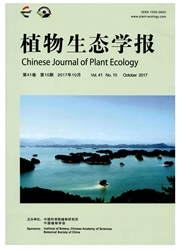

 中文摘要:
中文摘要:
研究处于片断化生境中濒危植物的繁育系统、传粉过程及生殖成功状况,可为评估物种的受胁迫程度及制订相应的保护和管理策略提供重要依据。通过野外观察和人工授粉实验等方法,对片断化生境中濒危植物黄梅秤锤树(Sinojackia huangmeiensis)的开花生物学和繁育系统进行了初步研究,并探讨了影响其生殖成功的因素。黄梅秤锤树的总状花序上通常有两性花2~6朵,单花花期约5~7d,单花花药不同步开裂使整朵花花粉活力持续时间延长。虽然花开放过程中柱头始终高于花药,在单花水平上可在一定程度上避免同花自交的发生,但由于花粉活力和柱头可授期之间有一定的重叠期,在自然情况下,由于外界媒介动物和风媒的作用,不可避免地会产生同株同花和同株异花传粉。实验结果表明,该种不存在无融合生殖现象,繁育类型以异交为主,部分自交亲和且需要传粉者。主要的传粉昆虫为黑带食蚜蝇(Epistrophe balteata)、中华蜜蜂(Apis cerana)和中华回条蜂(Habropoda sinensis)。黄梅秤锤树自然状态下的结实率较低(10.33%),平均每果种子数较少(0.387个),这主要与传粉昆虫少、花粉传递效率低,以及柱头上白花及同株异花花粉的落置和自交亲和性低有关。但是单株较大的开花量保证了一定的果实和种子产量,使居群能自然更新。部分自交亲和性可能为该物种适应生境片断化提供了一定的生殖保障及进化潜力。对该残存居群的保护,应着眼于加强对传粉昆虫赖以生存的自然生态系统的恢复。
 英文摘要:
英文摘要:
Aims Our objective was to assess the floral biology, breeding system and reproductive success in the naturally isolated population of Sinojackia huangmeiensis, an endangered plant in a fragmented habitat, in order to develop successful conservation strategies for this species. Methods We conducted field observations and artificial pollination experiments on the floral biology, pollination process and breeding system of So huangmeiensis in southern Hubei Province. Important findings The flowers of S, huangmeiensis were bisexual and protandrous, with two to six in a raceme on the top of lateral branches. The life span of a single flower was approximately 5-7 days. The viable pollen persistence of a single flower was prolonged because' of asynchronous dehiscing of anthers. The styles were always longer than the anthers in the opening flowers. Self-pollination was par- tially avoided by temporal and spatial isolation of male and female organs within the same flower. However, autogamous and geitonogamous selfing is unavoidable because of the large number of flowers on a single tree and the action of pollinators or wind on pollen dispersal. Our experiments indicated that no apomixis occurred, the breeding system was outcrossing with partial self-compatibility and pollinators were needed. The most frequent floral visitors were flies (Epistrophe balteata) and bees (Apis cerana and Habropoda sinensis). Fruit set and seed set in natural condition were 10.33% and 0.387, respectively. Lack of pollination insects, low pollination efficiency, deposition of self pollen and partial self-compatibility may account for the low fruit set and seed set. However, the large number of flowers in a single plant ensured production of fruits and seeds, which contributed to the natural population regeneration. From the evolutionary perspective, the partial self-compatibility may provide reproductive assurance and evolutionary potential, which was important to adapt to the fragmented habitat. We recommend recovery of the natural eco
 同期刊论文项目
同期刊论文项目
 同项目期刊论文
同项目期刊论文
 期刊信息
期刊信息
